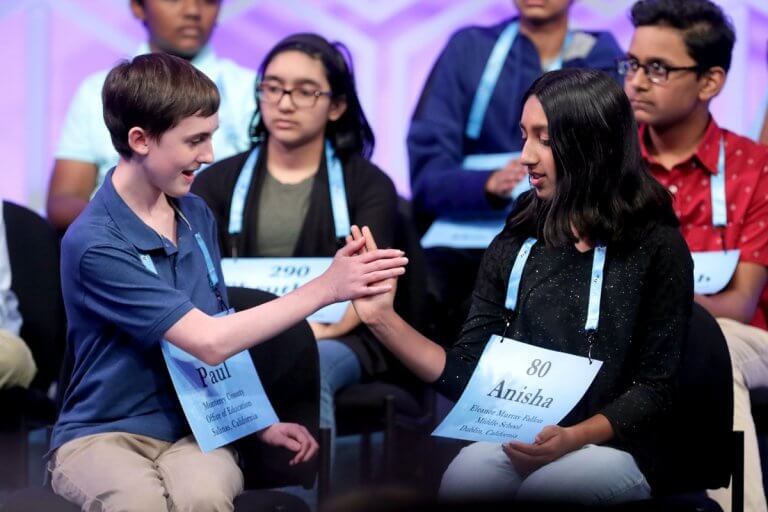
For the average person, the words “spelling bee competition” will likely evoke an image of students on a stage with large placards hanging over their necks, denoting their names and/or their participating number in a competition that aims to test who is the king or queen of spelling.
These contests are popular in many countries, including in the US, Canada, Australia and even India.
ESPN’s live broadcast of the Scripps National Spelling Bee – the ‘Olympics’ of spelling in the US, if you will – drew around a million viewers, according to The New York Times. If students outperform the competition to be crowned champion, they’ll walk away US$40,000 richer, in addition to having some serious bragging rights from beating hundreds of other students.
But more than a competition that tests school-going participants’ ability to spell complicated words that many adults would have difficulty spelling or pronouncing themselves, students also stand to gain in a myriad of ways, apart from building an impressive vocabulary at a young age.
So, for schools in countries where spelling bee competitions are not the norm, here are some of the potential benefits of spelling bee competitions for students:
It encourages students to read more voraciously

Learning new words means students will need to amp up their reading. Source: Shutterstock
In Australia, Glenmore Park Public School student Emilia McCarthy, who won the junior division of the Premier’s Spelling Bee, admitted to not knowing what some of the words that were thrown at her meant. However, she said the spelling bee was a good way to learn.
“I liked reading, and doing spelling stuff meant I got to do a lot more reading than I should,” she told ABC.
Students will learn the roots of a language
“Spelling is the intimacy with the languages. You have to want it, desire it,” according to the victor’s 16-year-old coach at the National Spelling Bee https://t.co/2KMhAh4E9V #learning
— Elena Yoo (@yoo__sensei) June 2, 2018
The 2018 Scripps National Spelling Bee winner Karthik Nemmani was crowned champion not merely for his ability to memorise tough English words, but also for his understanding of their history and meaning.
According to Time, Nemmani’s coach, Grace Walters, coached him on language patterns and etymologies, such as the roots and histories of words. This was in addition to quizzing him on words, honing his question routine, asking for a definition, language of origin, alternate pronunciation and part of speech before spelling each word.
The former judge for the Scripps National Spelling Bee and Merriam-Webster senior editor Linda Wood said, “The way the children learn the words is not just by rote studying, but through etymology and learning roots, pronunciations, and multiple definitions. This is invaluable in terms of building vocabulary.”
“Once children learn to break down words, they can decipher meanings of related words, develop a more extensive vocabulary and become better readers and writers overall.”
Wood adds, “With better reading comprehension, comes greater literacy, and greater enjoyment of reading, literature and language. All from understanding words.”
It can help build character
B.C. Spelling Bee students prepare for regional competition later todayhttps://t.co/Uyt6KWM2tw pic.twitter.com/3zlEaCpTPQ
— CBC British Columbia (@cbcnewsbc) April 16, 2016
What do the words ‘curmudgeonly’ or ‘serrefine’ mean?
Spelling difficult words in a room filled with anxious parents under a bright spotlight mean students have to be able to think and perform under pressure in front of an audience.
Speaking to CBC, Jas Bhatia, whose son participated in the regional Spelling Bee of Canada championships in 2016, said: “It is not just about spelling, it is about character building. How to be patient, wait for their turn and if they spell it wrong to cheer for their friends.”
Another parent, Kal Dosanjh, said: “I’m extremely proud. But more importantly, [the] competition of this nature is positive because it lets them explore more avenues of themselves and shows the result of that commitment.”
Students build their public speaking skills

With practice, students can build their confidence in public speaking. Source: Alex Wong/Getty Images/AFP
Public speaking is a common phobia, but spelling bee competitions expose students to public speaking from a young age.
With practice, students can build their confidence in public speaking, and it can become a less anxiety-inducing experience for them, regardless if they win the competition or not.
Liked this? Then you’ll love…
Are kids reading enough non-fiction?
Does replacing textbooks with tablets impact student learning?







